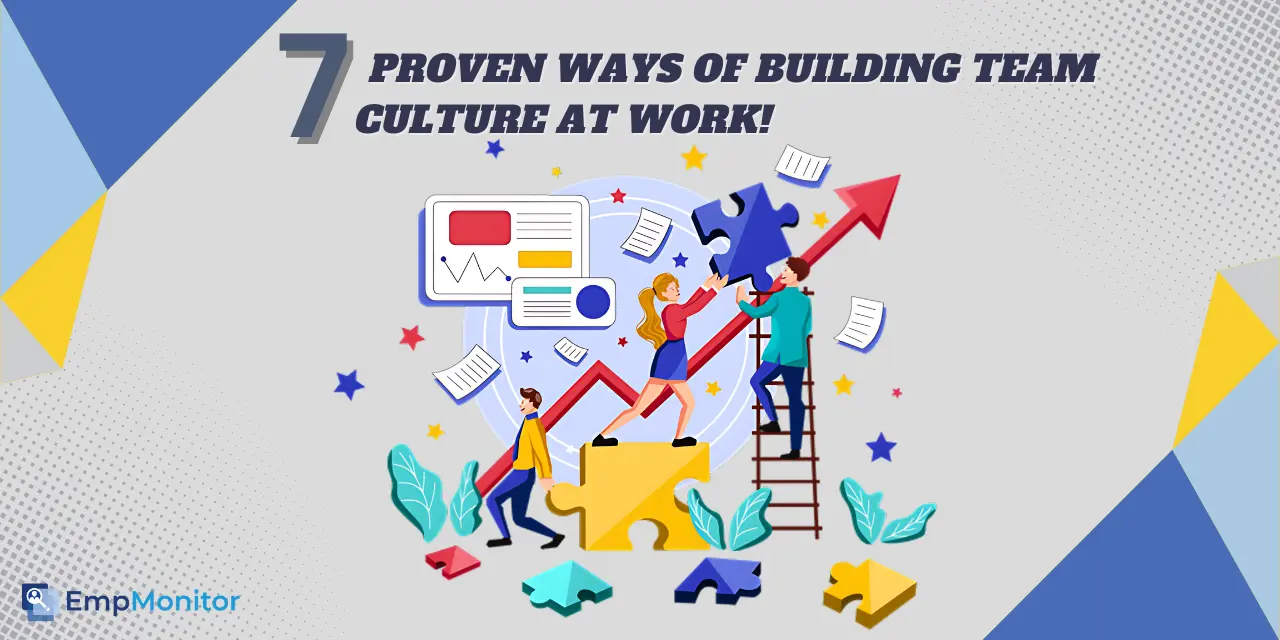Building team culture is like constructing a sturdy building. You need a solid foundation, detailed blueprints, and the right tools to bring it all together. In the case of your team, the foundation is shared values, the blueprints are your goals, and the tools are the strategies you use to foster collaboration and communication.
This blog post comprehensively guides you through building a thriving team culture. We’ll explore the importance of a strong team culture, delve into different team culture types, and equip you with actionable strategies to create a positive and productive work environment for your team. From setting clear goals to fostering open communication, we’ll cover everything you need to transform your group of individuals into a high-performing unit.
So, let’s dive into seven tried-and-true strategies to help you develop an impactful team culture at your workplace!
Hit ‘Play’ Button & Tune Into The Blog!
What Is Team Culture?
Team culture is fundamentally the character of a team. It comprises shared beliefs, values, attitudes, and behaviors that define how team members collaborate toward common goals. It encompasses things like:
- How are decisions made
- How openly do team members communicate
- How are conflicts resolved
- How much collaboration there is
- How individuals are recognized and rewarded
Trust, respect, and open communication form the foundation of a strong team culture. When team members feel comfortable sharing ideas, taking risks, and supporting each other, they’re more likely to be successful. Building team culture in an organization promotes trust, respect, and open communication among members. It can significantly influence the team’s performance, productivity, and overall success.
Importance Of Building Team Culture!
Strongly building team culture is crucial for several significant reasons:
Unity and Cohesion: Unity and cohesion among team members thrive when everyone shares common values, goals, and beliefs. This collaboration becomes more effective as they work harmoniously towards a shared purpose, benefiting from their vision.
Increased Motivation: Boosted morale and motivation at work can result from a supportive environment where team members feel valued and connected to their peers, leading to increased engagement and commitment to their work.
Enhanced Communication: Open and transparent communication thrives in teams where members feel comfortable sharing ideas, providing constructive feedback, and addressing issues effectively. This environment enhances collaboration and improves problem-solving capabilities.
Improved Performance: Building team culture improves performance levels and often hinges on a cohesive team dynamic where individuals feel included and motivated to surpass expectations, collaborating effectively to achieve outstanding results.
Retention and Attraction of Talent: Attracting and retaining top talent can be significantly influenced by an organization’s ability to create an environment where individuals feel a sense of belonging and alignment with team values.
Resilience in Challenges: During challenging times or periods of change, a strong team culture offers stability and support. Team members can rely on each other and the shared values of the culture to navigate difficulties and adapt to new circumstances.
Innovation and Creativity: Encouraging innovation and creativity within teams involves creating an environment where individuals feel empowered to freely express their ideas, fostering a culture that values diverse perspectives and encourages innovative solutions.
Healthy Conflict Resolution: Empowering team members to address conflicts constructively fosters healthy conflict resolution within teams, enhancing relationships and achieving positive outcomes instead of avoiding or escalating issues.
Building team culture isn’t merely about establishing a pleasant work atmosphere; it’s about laying the groundwork for a high-performing team capable of realizing its utmost potential. In essence, building culture at work is an investment in the success of your team and your organization.
Examples Of Team Cultures:
Team cultures can vary widely depending on factors like – industry, company size, leadership style, and organizational values. Here are several examples of different types of team cultures:
Collaborative Culture: In a collaborative culture, team members work together closely, sharing ideas, resources, and responsibilities. The team prioritizes collaboration over competition, emphasizing teamwork, collective problem-solving, and achieving shared goals. Open communication prevails, with constructive feedback given and received to facilitate continuous improvement.
Innovative Culture: Innovative culture encourages creativity, experimentation, and thinking outside the box. Team members are encouraged to innovate, explore new ideas, and embrace risks. While leaders foster a culture where learning from mistakes is valued, recognizing failure is integral to the innovation journey. They cultivate an environment that nurtures curiosity and where diverse perspectives drive innovation ahead.
Customer-Centric Culture: In a customer-centric culture, the team prioritizes fulfilling customer needs and ensuring satisfaction in all its actions. Team members are deeply committed to understanding customer preferences, anticipating their needs, and delivering exceptional experiences. The team guides every decision and action to delight customers and build long-term relationships built on trust and loyalty.
Learning Culture: In a learning culture, the emphasis is on ongoing growth and development. Team members are encouraged to expand their knowledge, skills, and expertise through formal training, mentorship, and experiential learning opportunities. The team regards feedback as a gift and considers mistakes valuable learning experiences. Leaders promote a culture of curiosity, where individuals are eager to learn from each other and their experiences.
Adaptive Culture: An adaptive culture exhibits agility, flexibility, and resilience. Team members are adept at navigating change, embracing uncertainty, and quickly adapting to new circumstances. There’s a willingness to challenge assumptions, pivot when necessary, and seize opportunities in a rapidly evolving environment. Leaders promote a growth mindset and encourage proactive problem-solving to thrive amidst change.
Ethical Culture: In an ethical culture, integrity, transparency, and moral behavior are non-negotiable values. Team members are committed to doing the right thing, even when difficult or unpopular. Decisions follow ethical principles, with zero tolerance for dishonesty, corruption, or unethical conduct. Leaders set the standard by exemplifying ethical behavior through their actions and decisions.
Fun and Supportive Culture: A fun and supportive culture prioritizes employee experiences, camaraderie, and work-life balance. Team members enjoy coming to work because they feel valued, respected, and supported by their colleagues and leaders. There’s a sense of community, where celebrations, team-building activities, and social events are encouraged to foster tough relationships and a positive work environment.
These are just a few examples of team cultures, and many organizations may exhibit a combination of these cultures or evolve based on their values, goals, and external factors.
How To Build A Team Culture?
How to build team culture is a common question because building team culture is essential for fostering collaboration, boosting morale, and achieving shared goals. Here are several approaches to foster a positive team culture:
Clear Goals: Know Where You’re Going
Define and communicate specific, measurable, achievable, relevant, and time-bound (SMART) goals to ensure every team member understands their role and how it contributes to the collective objectives. Regularly review and adjust these goals to stay aligned with the team’s progress and any changing circumstances.
Share Your Ideas:
Establish transparent and open communication channels through regular meetings and collaborative digital platforms. Encourage team members to share their thoughts, feedback, and concerns without fear of retribution, fostering a culture where listening is as valued as speaking. It plays a pivotal role in building team culture.
Trust Each Other: Be a Strong Team
Promote honesty and integrity in all team interactions, supporting team members in taking calculated risks and reassuring them that mistakes are learning opportunities. Create a workplace atmosphere where every individual feels valued and respected.
Work Together: Mix Ideas and Skills
Encourage team members to collaborate on projects and tasks, facilitating the sharing of skills and knowledge to solve problems and innovate. Recognize and reward collaborative efforts and successes to further promote teamwork.
Lead with Heart: Be Someone Others Look Up To
Show empathy by being accessible and understanding of team members’ viewpoints and challenges. Provide consistent support and recognition to foster a sense of belonging and motivation, leading by example with respect, kindness, and professionalism in all interactions.
Take Care: Look After Each Other
Implement programs and initiatives that promote physical and mental health, such as fitness activities, mental health resources, and flexible working hours. Encourage work-life balance to prevent burnout and maintain productivity, being proactive in identifying and addressing any well-being concerns within the team.
Learn and Grow: Celebrate Success and Learn from Mistakes.
Recognize and celebrate team accomplishments, whether significant milestones or small victories, to enhance morale and motivation. Conduct regular reviews to discuss what worked well and what could be improved, using failures as learning opportunities to create strategies and avoid similar issues in the future.
Fostering collaboration, engagement, and high performance among team members hinges on strongly building team culture. You can also use workforce management software like EmpMonitor to enhance workplace culture through powerful employee management.
EmpMonitor For Building Team Culture –
EmpMonitor is a software tool for monitoring employees in the workplace. It enables employers to supervise the activities of their employees on company-provided devices such as computers, laptops, and smartphones. EmpMonitor generally provides capabilities like capturing screens, tracking websites, logging keystrokes, monitoring application usage, and tracking time. EmpMonitor can play a role in building team culture in several ways:
Real-Time Activity Monitoring
EmpMonitor offers real-time activity monitoring to observe employee actions in real-time during the workday.
- Transparency: Promote openness by sharing activity reports, helping build trust within the team.
- Accountability: Encourage accountability by ensuring team members know their productivity undergoes monitoring.
Detailed Analytics and Reports
EmpMonitor produces detailed reports on employee productivity and performance.
- Performance Metrics: Utilize data-driven analytics to identify and reward top performers effectively, fostering a strong data culture.
- Team Progress: Regularly share team productivity reports to keep everyone informed and aligned.
Task Management
EmpMonitor includes a robust task management system for assigning and tracking tasks.
- Task Delegation: Seamlessly assign tasks to team members and monitor their progress in real time.
- Collaboration: Enhance collaboration by clarifying individual responsibilities and deadlines for all team members.
Time Tracking
The time tracking feature helps monitor working hours and ensure efficient time management.
- Work-Life Balance: Monitor working hours to avoid exhaustion and encourage a balanced work-life harmony.
- Efficiency: Analyze time spent on tasks to identify areas for improvement and optimize workflows.
Remote Employee Monitoring
EmpMonitor is ideal for monitoring remote employees, ensuring they stay productive and connected.
- Flexible Monitoring: Ensure remote workers stay actively engaged and productive, regardless of geographical location.
- Support: Provide support and resources to remote employees based on monitoring insights.
Ethically and transparently employing EmpMonitor is essential, ensuring employees comprehend its purpose and how it benefits the organization and the team. It can function as a handy tool for building team culture among employees within a firm.
Also Read:
Top 5 Innovative Ideas To Boost Morale At Work
7 Ways To Build An Extraordinary Team Culture In Your Workplace
What Is Team Cohesion And Why Is It Important?
Conclusion:
Ultimately, building team culture is essential for fostering a vibrant and efficient work environment. By implementing the strategies outlined in this blog post, you can cultivate a sense of trust, collaboration, and shared purpose among your team members. Remember, developing team culture is a continuous journey that demands consistent effort and improvement. By fostering open communication, celebrating successes, and learning from mistakes, you can achieve building team culture that empowers your team to achieve great things.
FAQs: –
Q1. What are some signs that indicate a strong team culture?
Signs of a strong team culture include extensive collaboration, open and transparent communication, mutual respect among team members, and a shared commitment to achieving common goals.
Q2. What role does feedback play in building team culture?
Feedback promotes continuous improvement, helps resolve conflicts constructively, and reinforces desired behaviors that contribute to building team culture positively.
Q3. How can remote or distributed teams build and maintain a strong team culture?
Remote teams can foster a strong culture through regular communication via video calls, using collaborative tools for sharing ideas and updates, organizing virtual team-building activities, and ensuring inclusivity despite physical distance.














